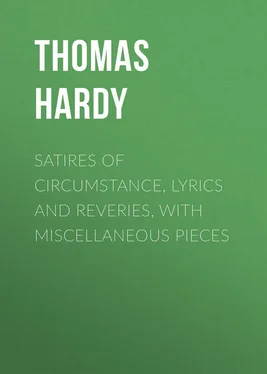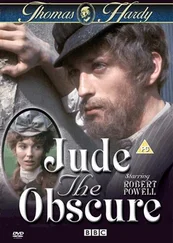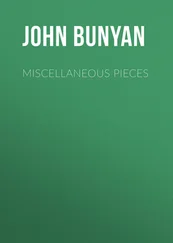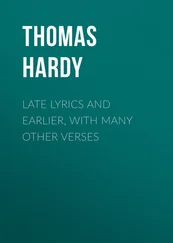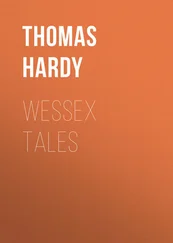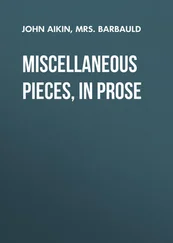And then its form began to fade,
Began to fade,
Its gentle echoes faintlier played
At eves upon my ear
Than when the autumn’s look embrowned
The lonely chambers here,
The autumn’s settling shades embrowned
Nooks that it haunted near.
And so with time my vision less,
Yea, less and less
Makes of that Past my housemistress,
It dwindles in my eye;
It looms a far-off skeleton
And not a comrade nigh,
A fitful far-off skeleton
Dimming as days draw by.
AFTER THE VISIT
( To F. E. D. )
Come again to the place
Where your presence was as a leaf that skims
Down a drouthy way whose ascent bedims
The bloom on the farer’s face.
Come again, with the feet
That were light on the green as a thistledown ball,
And those mute ministrations to one and to all
Beyond a man’s saying sweet.
Until then the faint scent
Of the bordering flowers swam unheeded away,
And I marked not the charm in the changes of day
As the cloud-colours came and went.
Through the dark corridors
Your walk was so soundless I did not know
Your form from a phantom’s of long ago
Said to pass on the ancient floors,
Till you drew from the shade,
And I saw the large luminous living eyes
Regard me in fixed inquiring-wise
As those of a soul that weighed,
Scarce consciously,
The eternal question of what Life was,
And why we were there, and by whose strange laws
That which mattered most could not be.
Whether to sally and see thee, girl of my dreams,
Or whether to stay
And see thee not! How vast the difference seems
Of Yea from Nay
Just now. Yet this same sun will slant its beams
At no far day
On our two mounds, and then what will the difference weigh!
Yet I will see thee, maiden dear, and make
The most I can
Of what remains to us amid this brake Cimmerian
Through which we grope, and from whose thorns we ache,
While still we scan
Round our frail faltering progress for some path or plan.
By briefest meeting something sure is won;
It will have been:
Nor God nor Daemon can undo the done,
Unsight the seen,
Make muted music be as unbegun,
Though things terrene
Groan in their bondage till oblivion supervene.
So, to the one long-sweeping symphony
From times remote
Till now, of human tenderness, shall we
Supply one note,
Small and untraced, yet that will ever be
Somewhere afloat
Amid the spheres, as part of sick Life’s antidote.
I
Sinking down by the gate I discern the thin moon,
And a blackbird tries over old airs in the pine,
But the moon is a sorry one, sad the bird’s tune,
For this spot is unknown to that Heartmate of mine.
II
Did my Heartmate but haunt here at times such as now,
The song would be joyous and cheerful the moon;
But she will see never this gate, path, or bough,
Nor I find a joy in the scene or the tune.
THE SUN ON THE BOOKCASE
( Student’s Love-song )
Once more the cauldron of the sun
Smears the bookcase with winy red,
And here my page is, and there my bed,
And the apple-tree shadows travel along.
Soon their intangible track will be run,
And dusk grow strong
And they be fled.
Yes: now the boiling ball is gone,
And I have wasted another day.
But wasted — wasted , do I say?
Is it a waste to have imaged one
Beyond the hills there, who, anon,
My great deeds done
Will be mine alway?
“WHEN I SET OUT FOR LYONNESSE”
When I set out for Lyonnesse,
A hundred miles away,
The rime was on the spray,
And starlight lit my lonesomeness
When I set out for Lyonnesse
A hundred miles away.
What would bechance at Lyonnesse
While I should sojourn there
No prophet durst declare,
Nor did the wisest wizard guess
What would bechance at Lyonnesse
While I should sojourn there.
When I came back from Lyonnesse
With magic in my eyes,
None managed to surmise
What meant my godlike gloriousness,
When I came back from Lyonnesse
With magic in my eyes.
A THUNDERSTORM IN TOWN
( A Reminiscence )
She wore a new “terra-cotta” dress,
And we stayed, because of the pelting storm,
Within the hansom’s dry recess,
Though the horse had stopped; yea, motionless
We sat on, snug and warm.
Then the downpour ceased, to my sharp sad pain,
And the glass that had screened our forms before
Flew up, and out she sprang to her door:
I should have kissed her if the rain
Had lasted a minute more.
I
I tore your letter into strips
No bigger than the airy feathers
That ducks preen out in changing weathers
Upon the shifting ripple-tips.
II
In darkness on my bed alone
I seemed to see you in a vision,
And hear you say: “Why this derision
Of one drawn to you, though unknown?”
III
Yes, eve’s quick mood had run its course,
The night had cooled my hasty madness;
I suffered a regretful sadness
Which deepened into real remorse.
IV
I thought what pensive patient days
A soul must know of grain so tender,
How much of good must grace the sender
Of such sweet words in such bright phrase.
V
Uprising then, as things unpriced
I sought each fragment, patched and mended;
The midnight whitened ere I had ended
And gathered words I had sacrificed.
VI
But some, alas, of those I threw
Were past my search, destroyed for ever:
They were your name and place; and never
Did I regain those clues to you.
VII
I learnt I had missed, by rash unheed,
My track; that, so the Will decided,
In life, death, we should be divided,
And at the sense I ached indeed.
VIII
That ache for you, born long ago,
Throbs on; I never could outgrow it.
What a revenge, did you but know it!
But that, thank God, you do not know.
BEYOND THE LAST LAMP
(Near Tooting Common)
I
While rain, with eve in partnership,
Descended darkly, drip, drip, drip,
Beyond the last lone lamp I passed
Walking slowly, whispering sadly,
Two linked loiterers, wan, downcast:
Some heavy thought constrained each face,
And blinded them to time and place.
II
The pair seemed lovers, yet absorbed
In mental scenes no longer orbed
By love’s young rays. Each countenance
As it slowly, as it sadly
Caught the lamplight’s yellow glance
Held in suspense a misery
At things which had been or might be.
Читать дальше
